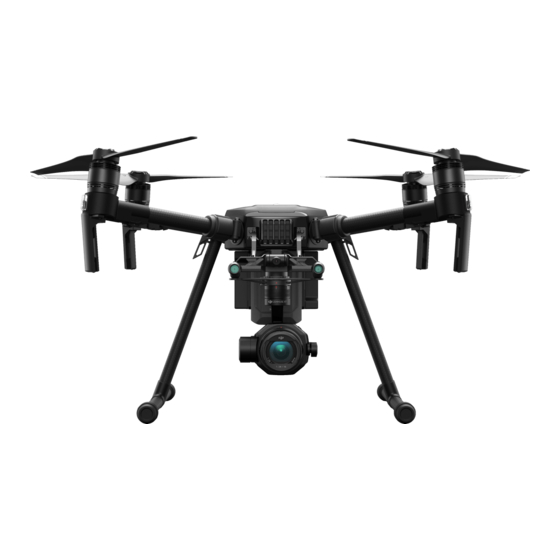dji MATRICE 200 series Clause de non-responsabilité et consignes de sécurité - Page 9
Parcourez en ligne ou téléchargez le pdf Clause de non-responsabilité et consignes de sécurité pour {nom_de_la_catégorie} dji MATRICE 200 series. dji MATRICE 200 series 20 pages.
Également pour dji MATRICE 200 series : Manuel d'entretien (2 pages), Manuel de démarrage rapide (15 pages), Faq (2 pages)

3. Tall buildings may adversely affect the Failsafe function. Please
adjust the aircraft location, altitude and speed while returning
home to avoid obstacles. Aircraft will stop ascending and
immediately return to the Home Point if you move the left stick if
the aircraft reaches 65 feet (20 meters) altitudes or beyond during
Failsafe.
4. Make sure to operate the aircraft within the transmission range of
the remote controller.
5. Only use the Failsafe and Return to Home functions in case of
emergency. Such functions may be affected by the weather, the
environment, or any nearby magnetic fields.
6. The aircraft cannot avoid obstacles during the Failsafe RTH when
lighting condition is not ideal. Therefore, it is important to set an
appropriate Failsafe altitude before each flight.
7. If the battery life so allows, the aircraft may first return to the last
position where it had connection with the remote controller during
the Failsafe RTH. As a result, you may observe the aircraft first
flying away from you, then returning to the home point.
Low Battery
1. When the Critical Battery Level Warning activates and the
aircraft is descending automatically, you may push the throttle
up to maintain the aircraft's altitude and navigate it to a more
appropriate location for landing.
2. When battery warnings are triggered, promptly bring the aircraft
back to the Home Point or land to avoid losing power during
flight and causing damage to the aircraft, property, animals, and
people.
D-RTK (For M210 RTK)
1. Only use genuine DJI parts or parts certified by DJI. Unauthorized
parts or parts from non-DJI-certificated manufacturers may cause
the system to malfunction and compromise safety.
2. Operate in an open environment free from radio interference.
The antennas should be kept at the same height and DO NOT
obstruct each other when used.
3. DO NOT bend or fold the antenna cable excessively.
4. Ensure that the D-RTK
TM
and its components are free from
contamination (e.g. water, oil, soil and sand).
Vision System and Infrared Sensing System
1. The Vision System cannot work properly over surfaces that do
NOT have clear pattern variations. The Vision System is only
effective when the aircraft is at altitudes of 0.3 to 10 meters.
2. The Vision System may NOT function properly when the aircraft is
flying over water.
3. Keep your pets away from the aircraft when the Vision System is
activated, as the sonar sensors emit a high frequency sound that
is only audible to some pets.
4. Operate the aircraft cautiously when in any of the following
situations:
a. Flying over monochrome surfaces (e.g., pure black, pure
white, pure red, pure green).
b. Flying over highly reflective surfaces.
c. Flying at high speeds (over 14m/s at 2 meters or over 5m/s at
1 meter).
d. Flying over water or transparent surfaces.
e. Flying over moving surfaces or objects.
f. Flying in an area where the lighting changes frequently or
drastically.
g. Flying over extremely dark (< 15 lux) or bright (> 10,000 lux)
surfaces.
h. Flying over surfaces that can absorb sound waves (e.g., thick
carpet).
i. Flying over surfaces without clear patterns or texture.
j. Flying over surfaces with identical repeating patterns or
textures (e.g. tiles with same design).
k. Flying over inclined surfaces that will deflect sound waves
away from the aircraft.
l. Tiny obstacles (with less infrared reflection energy).
10
5. In the event of loss of the remote controller's signal and the GPS
signal is weak, if the aircraft cannot detect the Home Point, the
aircraft will hover for 8 seconds and then auto-land if it is in "P"
mode.
6. Vision System calibration is required if the aircraft suffers from
crashing. Calibrate the Vision System if the DJI GO 4 app
prompts you to do so.
7. Please be mindful of blind spots (grey) of the Vision System and
Infrared Sensing System.
Downward vision system is only used for positioning.
9. Do not use other ultrasonic devices with frequency of 40 KHz or
more/less when Vision System is in operation. Keep the sensors
clean and at all times. DO NOT temper with the sensors.
10. The Vision System and Infrared Sensing System are not able to
brake and stop the aircraft at a safe distance from an obstacle if
the aircraft speed exceeds 14m/s (31.3 mph).
10m
